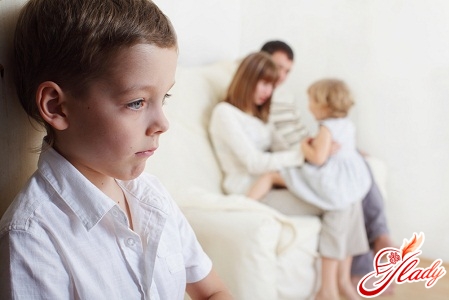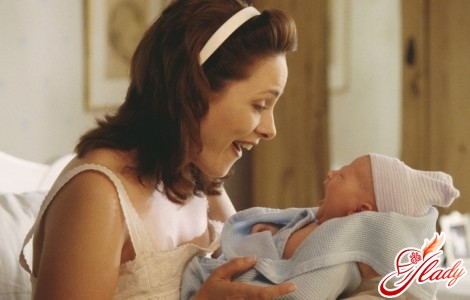 The appearance of the baby in the family for the older child inmany cases are not without problems. First of all, in an accessible form for his age, the older child needs to talk about childbirth and teach how to treat a newborn.
The appearance of the baby in the family for the older child inmany cases are not without problems. First of all, in an accessible form for his age, the older child needs to talk about childbirth and teach how to treat a newborn.
When is it best to announce pregnancy?
If the child is concerned about your badstate of health in the morning, you can explain to him right away that you are expecting a baby (brother or sister). But in this case he will have a long wait, small children do not have a correct idea of time and will often need to explain to him that the moment of appearance of the baby has not yet come. You can postpone the pregnancy report to the second half of it, you can delay until the last moment, when pregnancy becomes noticeable. Date of birth of the baby can be made more understandable to the child, if you associate it with any significant event or time of the year. You can conduct a special calendar with the child, which will help you, otherwise the elder will constantly ask when the newborn will appear. Some parents are reluctant to report pregnancy, as they do not want the child to feel relegated to the background. But, putting off the conversation, you do not solve the problem. Try to inform your child about pregnancy early enough so that you have the opportunity to help him get positive and get involved in joint preparation for the birth of a newborn. When discussing the appearance of a brother or sister with your child, give examples of families that you know who have several children. Find out what he already knows about pregnancy and childbirth and try to correct his delusions, tell about what he does not know, answer the questions. In doing so, try not to overload the small child with an abundance of information.
- Read books on pregnancy, childbirth, newborns, and how an older brother or sister should behave with a child.
- Give the child to listen to the baby's heart beatingand feel his movement. Talk to your child about the development of the fetus. Tell him that the fetus already knows how to do (for example, hiccough, sucking a thumb, hearing, kicking).
- Show your child photos and videos of the time when he was a baby, pay attention to those of them where you or his father look after him, like a newborn.
- Let your child watch the babies, and play them. Pay attention to the fact that they are small and sometimes do not understand how to play.
- Ask the child to help you collect all the things you need for the hospital. If he has to stay with someone else while you are in the hospital, prepare the child and everything you need.
- In advance, a few months before the birth, dorearrangement in the nursery or bedroom, so that after the birth of the baby the oldest child suddenly did not feel superfluous. Put the baby cot so that the older child is used to the fact that the baby will be sleeping here.
- Allow the child to decide when and how long to discuss the upcoming birth and the appearance of the baby. Be tactful and do not overload your child with talk about a newborn.
Separation from mother at the time of birth
A child's experience during your stay inThe maternity hospital largely depends on his age, care for him in your absence. Most children, to one degree or another, have experience of separation, while they were worried, crying, calling their mother, cuddling up to other people, often annoyed, hardly falling asleep and getting angry. When mom returns, most children are very happy about this, however some children continue to behave badly and even ignore their mother. Thus, children express their fear of loneliness. You can do a lot to reduce the excitement of the child due to your separation. In the last weeks of pregnancy, tell your child that you are going to the hospital. If possible, go along with the child to the hospital. Explain to the child where he will live (at home or away) and who will take care of him while you are away. The child will be less worried if he is well acquainted with the person who will look after him in your absence. A close friend, a relative, will make your separation less painful for the child. When the birth begins, tell the child when you will leave and where you are going. If the child is not yet fully able to take care of himself (for example, take a bath or go to bed), then during the period before childbirth, the role of the father and other adults, to which the child is well treated, significantly increases. It is desirable that the child has a clear schedule of the day, which will not seriously disturb your hospitalization or the appearance of a newborn. Think about the baby's visit to the hospital in order to visit you and the newborn. Early communication of children with each other makes a great contribution to the emotional atmosphere of the family, and in many maternity homes such visits are allowed. Perhaps he will calm down when he sees you and the baby, and such a visit will play a positive role. However, he can ignore you and the newborn, or he will stick too much and start crying when the time comes to go. And you will feel that it is better for both of you to completely abandon such visits. It is clear that it is hard for a small child to see you for a short time and not be able to stay with you, but even a short meeting will please him and help him calm down. Negative reactions of the child indicate that he is experiencing stress, and visiting the hospital gives him the opportunity to express his anger and grief. If the child can not visit you, contact him in any other way - phone, send photos, notes and gifts.
Appearance of the newborn in the house
 Not only separation from the mother will botheryour child, but also the constant presence of a helpless crying newborn who requires attention. After the appearance of the baby for your older child, life becomes different. Parents, who before that entirely belonged to him, suddenly became inaccessible, and all because of the newborn! Older children react differently: temporary outbursts of anger, demanding attention to themselves, returning their childhood habits, for example by sucking a finger, asking to give him a bottle or breastfeed, wet panties, increased attention to the baby, aggressive acts towards the parents and newborn (can hit, bite, scatter things), as well as unwillingness to eat and sleep on time. Sometimes parents who have never experienced such behavior of their child before, are very surprised. Often, children quickly calm down, but in some cases, weeks and months may pass before your child begins to perceive the birth of a newborn in the family. Children of different ages react to the appearance of a newborn in their own way. Children 3-4 years, as a rule, immediately understand the effect the newborn has on their relationship with parents, older children can take offense at the baby, feel this guilt and try to hide this feeling from the parents. Perhaps the best way to help your older child is to take any forms of his behavior. Try not to be upset. Accept his behavior for granted and continue to communicate with the child, as if nothing had happened. Try to positively adjust the child to the appearance of a newborn in the family:
Not only separation from the mother will botheryour child, but also the constant presence of a helpless crying newborn who requires attention. After the appearance of the baby for your older child, life becomes different. Parents, who before that entirely belonged to him, suddenly became inaccessible, and all because of the newborn! Older children react differently: temporary outbursts of anger, demanding attention to themselves, returning their childhood habits, for example by sucking a finger, asking to give him a bottle or breastfeed, wet panties, increased attention to the baby, aggressive acts towards the parents and newborn (can hit, bite, scatter things), as well as unwillingness to eat and sleep on time. Sometimes parents who have never experienced such behavior of their child before, are very surprised. Often, children quickly calm down, but in some cases, weeks and months may pass before your child begins to perceive the birth of a newborn in the family. Children of different ages react to the appearance of a newborn in their own way. Children 3-4 years, as a rule, immediately understand the effect the newborn has on their relationship with parents, older children can take offense at the baby, feel this guilt and try to hide this feeling from the parents. Perhaps the best way to help your older child is to take any forms of his behavior. Try not to be upset. Accept his behavior for granted and continue to communicate with the child, as if nothing had happened. Try to positively adjust the child to the appearance of a newborn in the family:
- Before the birth of a newborn, play with the doll showing how the child cares for her.
- Stay alone with your older child, play with him in his favorite games during a newborn's sleep or when someone else is looking after him.
- Give the older child as much attention as possible. Not responding to his requests and comments, you thereby demean your child's self-esteem in such a difficult period of his life.
- If the child behaves badly, do itremark, as usual. Do not allow the older child to cross the permitted boundaries and violate the rules of conduct adopted in the family. You should not feel guilty that another child has appeared in the house, let alone show this feeling.
- Express your emotions about the troubledbehavior of the baby with the older child, share your concerns with him, this you will help and formulate and throw out your discontent with the loud crying of the baby or your constant cares about him.
- After returning from the hospital, celebrate the birthday of a new member of the family with a treat for everyone. Give the older child a gift and advise him to make or find a gift for the baby.
- If the child wants to help you take care ofnewborns, allow him to perform some duties according to this age: hold the baby, change diapers, dress and bathe, help feed or make the kid laugh, sing to him and talk to him.
- If the older child does not want to take care of the baby, do not force him to do it.
- Do not try to impose a love for a baby on the older child, show tact and patience in matters of their relationship.
- Help the older child realize that he is able to do much of what is not yet available to the baby, for example, to inflate balloons, make cookies or wash dishes.
- Do not forget about yourself. Rest when possible. This does not diminish the feelings of resentment or jealousy of older children, but it will be easier for you to cope with it.
Remember that the older child is difficult, sometimes evenpainfully adapt to the appearance of a newborn, but this is part of a normal life experience. Your efforts should be directed to ensure that the elder child does not feel hurt, and most importantly, that he normally perceives this event and with your support correctly treated the newborn. We advise you to read:









